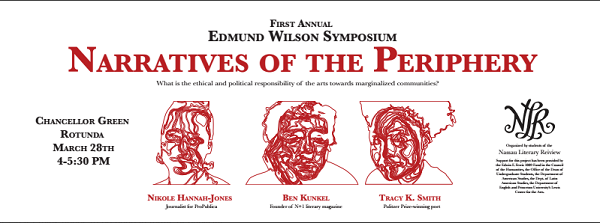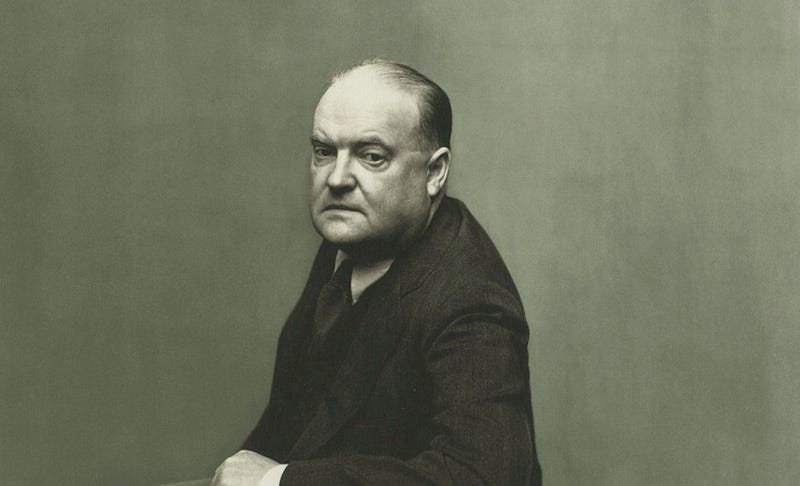Introducing the First-Annual Edmund Wilson Symposium: Narratives of the Periphery

The Nassau Literary Review is pleased to announce that we’ll be hosting our first annual Edmund Wilson Symposium this coming Saturday (3/28). The Symposium was organized and planned by the students of the Nassau Literary Review. We hope to have a Symposium of this sort every spring from now on.
This year’s Symposium, titled Narratives of the Periphery, seeks to address the following question:
What is the ethical and political responsibility of the arts towards marginalized communities? Can and should the arts speak for those who have no voice in our larger culture because of their race and social class — and if so, how can they do this?
We’ve also assembled an interdisciplinary and all-star group of guest speakers in order to discuss this most important of subjects:
Tracy K. Smith, a Pullitzer-Prize winning poet and author of Life on Mars;
Nikole Hannah-Jones, an investigative journalist for ProPublica who works on issues of institutional racism and is the author of Living Apart: How the Government Betrayed a Landmark Civil Rights Law as well as a recent acclaimed report on resegregation;
and Benjamin Kunkel, author of Indecision and Utopia or Bust, a novelist and essayist and co-founder of the literary and political journal n+1.
The main event of the Symposium will be an hour and a half long panel discussion in the Chancellor Green Rotunda at 4:00 PM, followed by a reception at 5:30 PM. For more information and to RSVP, please take a look at our events page on Facebook. Admission is free. And if you find this project as exciting as we do, please make sure to tell your friends ; no purely undergraduate-organized event of this nature exists on campus, and we feel strongly that the success of this Symposium series could help foster a new culture of serious, student-driven, independent intellectual and artistic exchange.
***

You may be wondering why we chose to name our Symposium series after Edmund Wilson (1895–1972). Though little known to the average reader today and little studied in the academy, during his lifetime Wilson was a sort of literary celebrity and generally regarded as one of the most important literary critics, essayists, and men of letters of the twentieth century. A friend of F. Scott Fitzgerald, John Peale Bishop, and Christian Gauss, he graduated from Princeton in 1916 and edited the Lit precisely a century ago, ushering in what has been called its golden age. Wilson went on to have a long and varied career as a major intellectual figure in American and global literary circles. His vast output of literary criticism (most beautifully captured in the classic study Axel’s Castle) placed American literature in the context of global and European avant-garde traditions and created the first definitive critical accounts of the major literary figures of his day (including Joyce, Eliot, Hemingway, Woolf, Fitzgerald, Proust, Dos Passos, Faulkner, Stevens, Yeats, Stein, and many others), often when they were still obscure and unpopular. In many ways we owe it to Wilson that we even read these authors, or at any rate read them the way we do: controversially, but without much exaggeration, it can be said that Wilson more or less singlehandedly helped the American reading public make sense of modernism as it was unfolding.
But Wilson was not just a literary critic. His journalistic abilities were on full display when he wrote the articles that would later become American Earthquake, an impressionistic and heartbreaking depiction of the rabid income inequality, post-Boom squalor, and political instability of the 1930s; his To the Finland Station remains one of the most vivid and rich intellectual histories of socialism ever written; his multi-volume collected private journals rival those of Samuel Pepys for the almost uncanny way they seem to contain all the major intellectual movements and personality (not to mention personalities) of his time; he was a translator of Russian and a prolific travel writer whose journeys took him across Central and Eastern Europe and the Middle East; he wrote the first in-depth report for a popular audience of the discovery and implications of the Dead Sea Scrolls; and his political writing, often deeply personal as well as rigorously historical, tackled such thorny topics as class warfare in America, the history of the Civil War, the ethnic cleansing and extinction of the indigenous peoples of North America, and harsh critiques of America’s foreign policy during the Cold War.
Throughout his life and in all his writing, Wilson embodied what now seems like an outmoded type: the public intellectual. Though his works were widely respected and carefully researched, he never became a professor or wrote for a primarily scholarly audience; instead, for all his life he wrote entirely for an educated lay audience and published in the intellectual magazines which introduced this public to otherwise obscure ideas for the first time (mostly at the New Republic and the New Yorker, as well as many smaller magazines since forgotten). Always readable and never arcane, his writing was full of life and humor and tied intimately to the history of ideas and the greatest sociopolitical concerns of his day.
Life and literature were not separate things for Wilson; rather, literature was a window into life itself, in all its shades and complications. We have adopted his name for our Symposium because we believe such an event — with its promise of an interdisciplinary conversation directed at a broader public among serious thinkers about the most important topics of our day — is a continuation of his legacy. We sincerely hope you can join us to help us ensure such a tradition of public intellectualism endures into this century and does not become merely an obscure historical artifact.
Support for this project has been provided by the Edwin F. Ferris 1889 Fund in the Council of the Humanities, the Office of the Dean of Undergraduate Students, the Program in American Studies, the Department of Latin American Studies, the Department of English, and the Lewis Center for the Arts.